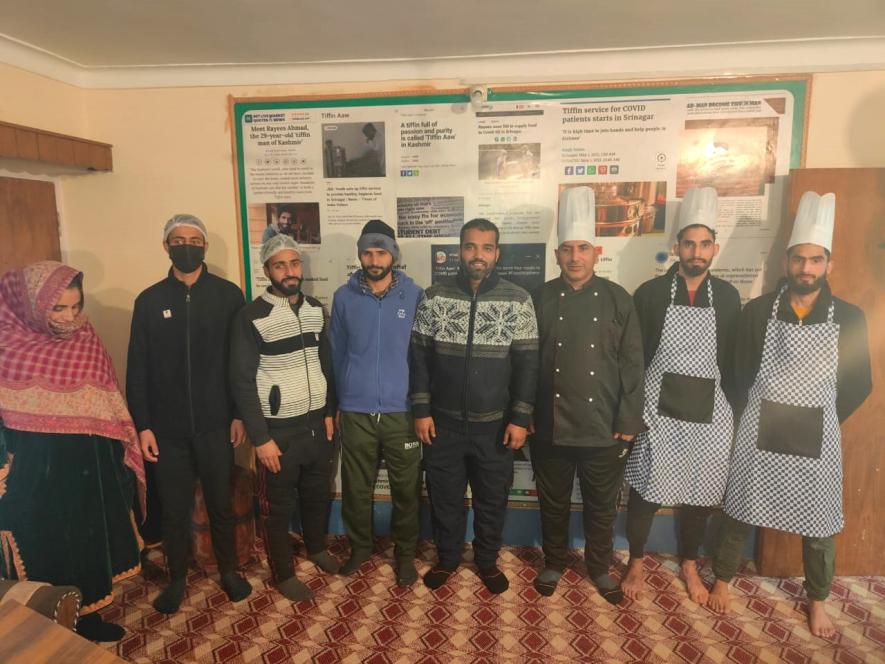J&K: End of 149-year-old Darbar Move Tradition Hits Already Struggling Businesses

The cancellation of the Darbar Move, the bi-annual tradition of shifting the Jammu and Kashmir secretariat from one capital to another, has upset traders across the Union Territory as it would mean huge losses to them amid a battered economy hit by three consecutive lockdowns.
As a part of the 149-year old Darbar Move practice, hundreds of files used to be moved in trucks from Srinagar to Jammu during winters and Jammu to Srinagar during summers.
On June 30, a notification by the administration asking employees to vacate their Darbar Move accommodations in three weeks from Jammu and Srinagar marked the end of the tradition. Soon after the government’s decision , Traders voiced their concerns saying that the end of the bi-annual tradition would harm Jammu’s economy.
Surinder Mahajan, president of Raghunath Bazar Businessmen’s Association told Newsclick, “Darbar Move was the backbone of the economy in Jammu. Our sales would pick up with the migration of 10,000 employees from Kashmir. Now, we don’t know what the future holds for us.”
Prior to the decision, the Jammu and Kashmir government had digitised nearly 3 lakh physical files that were earlier moved from one capital to another. Lieutenant Governor, Manoj Sinha had said that ending the Darbar Move would save the government Rs 200 crore per year.
However, the traders’ associations have termed the decision as “wrong.”
Mahajan added, “It is not only employees, many other sections would be affected by this including hoteliers, shopkeepers, businessmen and others. The Darbar Move also paved way for the intermixing of cultures (Kashmiri and Dogra).”
The recent decision to stop Darbar Move has put spotlight on the bleak economy of Jammu and Kashmir. Unlike other states, Jammu and Kashmir has faced three years of lockdown (including 2021) after the abrogation of Article 370 of the Indian Constitution, which was accompanied by curbs and restrictions.
Both the Jammu and Kashmir divisions are struggling to survive after three consecutive lockdowns led to massive losses of over Rs 40,000 crore.
Speaking to Newsclick, Hilal Mandoo, President of Kashmir Traders Association, said, “J&K economy has been massively impacted. We are facing massive losses of over Rs 40,000 crore including transporters, hosieries, and others. We have lost around 1.5 crore per day. The situation is grim.”
In addition, the tourism sector is badly hit due to the lockdowns. Kashmir, which is majorly dependent on tourism, is grappling with the acute fall in number of tourists. With fewer visitors in sight, the lives of Shikarawallas are also affected.
Wali Muhammad, the president of Shikara Wallah association, told Newsclick that the workers were finding it hard to make ends meet. “We are just surviving. We have taken debts from almost everyone. We are doing odd jobs but it is not helping. Recently, under the government scheme, we received Rs 1,000 but that is negligible. I don’t know for how long we will be able to survive this,” Muhammad said.
The concerns of the traders and businessmen in Jammu and Kashmir have been further exemplified by political leaders including former Chief Minister Mehbooba Mufti who had recently termed the Darbar Move cancellation as “insensitive.”
“GOIs recent decision to stop Darbar move is penny wise & pound foolish. Its economic & social benefits outnumber expenses incurred for moving the capital during summer & winter. Quite obvious that such insensitive decisions are taken by those who least care for J&K's welfare,” she wrote on Twitter.
With the major sectors including tourism, trade, business, and handicraft getting affected, the brunt is being borne by the marginalised sections comprising poor labourers and workers.
Deshraj Kumar, 63, a resident of Jammu’s Samba district, is facing a serious financial crisis. Following the coronavirus-induced lockdown announced last March, he started taking ration on debt. Unable to pay the debt amount, Kumar started selling vegetables but suffered major losses. Kumar, a daily wager, who washes utensils at weddings, said that he has witnessed days when he had slept empty stomach.
Kumar lives by himself. He lost his wife many years ago during an accident that also affected his limbs. With the restrictions lifted, Kumar has been able to find some work but the little money that he earns is gone into paying the debt. Recently, his married daughter Neeru has come to visit her. “There were days when papa thought its better to end life than to survive like this. But I kept assuring that things will be fine. But I was wrong, things are not fine. How will we pay the debt? We have no savings. And the coronavirus does not seem to be going away. I don’t want him to starve again,” she said.
Get the latest reports & analysis with people's perspective on Protests, movements & deep analytical videos, discussions of the current affairs in your Telegram app. Subscribe to NewsClick's Telegram channel & get Real-Time updates on stories, as they get published on our website.
























